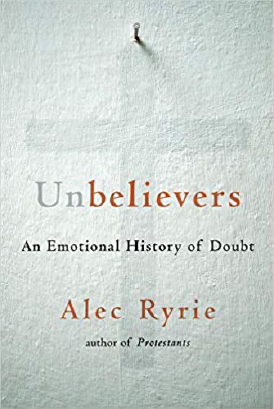 Books of Note for St. Thomas the Apostle’s Readers and Their Friends. This month’s feature book is Unbelievers: An Emotional History of Doubt, by Alec Ryrie | Belknap Press of Harvard University Press, 2019 ISBN-13: 978-0-674-24182-4
Books of Note for St. Thomas the Apostle’s Readers and Their Friends. This month’s feature book is Unbelievers: An Emotional History of Doubt, by Alec Ryrie | Belknap Press of Harvard University Press, 2019 ISBN-13: 978-0-674-24182-4
Particularly pertinent for the Doubters of St. Thomas Church, Unbelievers is a refreshing, provocative take on the origins of unbelief. Ryrie, of Church of England extraction, is Professor of the History of Christianity at Durham University in the UK. Instead of falling into the old grooves of argument, Ryrie rejects the general opinion that atheism and unbelief arose in response to the 18th Century Enlightenment in Europe. Modern unbelief instead, he contends, is not so much a response to ideas big or small, but is instead emotional. Two main emotions, anger and anxiety, are at the roots of modern secular unbelief. These two strains of emotion spring up vividly much earlier than the Enlightenment, originating in the battles between orthodox Roman Catholic teaching and Protestant claims about the primacy of Scripture in the Protestant Reformation of the 16th Century. Disputes gave way to anger as both sides shot barbs of disbelief into the tenets of their opponents, but if anything, anxiety over faith in God has proven to be stronger in shaping our secular world.
Religion demanded faith of its adherents, writes Ryrie. Anger and anxiety about religion moved preachers, women writers, essayists, poets, prelates, and playwrights to struggle with faith and doubt from the Reformation right up to our own current time. Belief, Ryrie argues, is first a practice, an emotional response that only later gathers up theory to support an emotional position already adopted—a fascinating take on the formation of faith and the role of doubt necessary to establish it. Ryrie’s prose is artful, nuanced and often humorous, written with a master storyteller’s talent for making historical voices relevant to our times, even while they reflect a much different worldview from our own.
Unbelievers gives doubt a good name. The book’s thesis is challenging, heart-wrenching, and mind-changing. Seldom does a book engage an issue that reaches out and touches each one of us. Alec Ryrie has managed it, much to the benefit of his readers on both sides of “The Pond.”
– Stephen V. Sprinkle, Theologian-in-Residence

